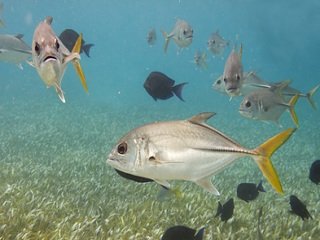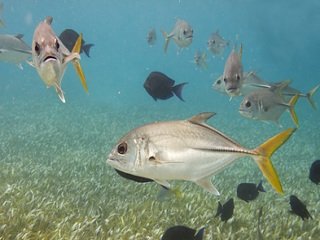 Like many of you, I know what it’s like to take on a new angling challenge and quickly come to the realization that I’m totally unprepared for it, in terms of knowing anything about the fish I may be seeking. I remember being totally in the dark when it came to targeting alligator gar in the Louisiana, and then again when I first tried my hand at floating for steelhead in Indiana. New experiences spur us on to learn, though, whether it’s through experience or other resources. Today, I continue providing a little information on popular fish species with a spotlight on one of the most highly-sought saltwater fish out there: the jack crevalle.
Like many of you, I know what it’s like to take on a new angling challenge and quickly come to the realization that I’m totally unprepared for it, in terms of knowing anything about the fish I may be seeking. I remember being totally in the dark when it came to targeting alligator gar in the Louisiana, and then again when I first tried my hand at floating for steelhead in Indiana. New experiences spur us on to learn, though, whether it’s through experience or other resources. Today, I continue providing a little information on popular fish species with a spotlight on one of the most highly-sought saltwater fish out there: the jack crevalle.
Jack crevalle can be identified by their high, blunt head and a distinguishable black spot on the back edge of their gills. They’re silvery in color, but the tops of their back can range from being blue to green to black, with their stomach being silver and then fading to yellow. Their tails are also yellow. The jack crevalle’s dorsal fin is actually split between a smaller front portion and a more pronounced rear portion that extends along its back. You can also easily spot their lateral line, which is defined by a series of light notches along its side.
Found in waters ranging from the Gulf of Mexico and along the Eastern coast of South America, all the way to the West coast of Africa, the jack crevalle’s main habitat varies depending on age. Normally, older fish can be found in deeper waters, while younger ones will remain inshore, preferring sandy bays, beaches, and lagoons. They primarily feed on smaller fish, such as herring, as well as shrimp and crab.
Jacks can be fished with a variety of techniques. Live bait users will want to use small fish hooked through the back and use a few feet of heavy leader (30-40-pound) attached directly to your main line. They’re not too picky when it comes to artificial lures. You can throw bright jigs, surface plugs, or even spoons to catch them, but be sure to speed up your retrieve when you see a jack following your lure. They love to chase their bait and a slow retrieve won’t appeal to this instinct. Jack crevalle are known for the ferocious fight they put up when hooked, though, so be prepared for a test of strength and endurance when you get a strike.
Pound for pound, jack crevalle are known to be one of the strongest, feistiest fish in saltwater. They love to hunt and the challenge of the chase will entice them to strike time and time again. If you find yourself in search of a jack the next time you hit saltwater, be prepared for one heck of a ride!








